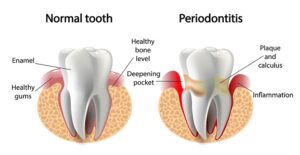
by Dr. Jacqueline S. Allen | Aug 31, 2017 | Blog, General Information, Patients
 Often times, men and woman question why they should care about their oral health. While many people focus on physical health, oral health tends to fall beneath the wayside. Oral health plays an incredibly important role in your physical health and should not be overlooked! Some might think a little gum bleeding is not so bad, but gum disease can lead to many severe problems. The severity of gum disease ranges from a mild type known as gingivitis to a more serious kind called periodontitis. The most severe cases of gum disease can result in tissue damage, bone loss, and even tooth loss. Do you think losing your teeth can simply be replaced by implants? It’s not that easy. Implants are not only expensive but often cannot be performed because of bone loss, one of the effects of gum disease. Because of this, the patient is forced to consider bridges or even dentures. Treatment of gum disease depends on a number of factors including the severity of the disease, the quality of your oral health care, and risk factors such as smoking, diabetes, and pregnancy. According to the American Dental Association (ADA):
Often times, men and woman question why they should care about their oral health. While many people focus on physical health, oral health tends to fall beneath the wayside. Oral health plays an incredibly important role in your physical health and should not be overlooked! Some might think a little gum bleeding is not so bad, but gum disease can lead to many severe problems. The severity of gum disease ranges from a mild type known as gingivitis to a more serious kind called periodontitis. The most severe cases of gum disease can result in tissue damage, bone loss, and even tooth loss. Do you think losing your teeth can simply be replaced by implants? It’s not that easy. Implants are not only expensive but often cannot be performed because of bone loss, one of the effects of gum disease. Because of this, the patient is forced to consider bridges or even dentures. Treatment of gum disease depends on a number of factors including the severity of the disease, the quality of your oral health care, and risk factors such as smoking, diabetes, and pregnancy. According to the American Dental Association (ADA):
Warning signs that can signal a problem:
- gums that bleed easily
- red, swollen, tender gums
- gums that have pulled away from the teeth
- persistent bad breath or bad taste
- permanent teeth that are loose or separating
- any change in the way your teeth fit together when you bite
- any change in the fit of partial dentures
Factors, which increase the risk of developing gum disease, are:
- poor oral hygiene
- smoking or chewing tobacco
- genetics
- crooked teeth that are hard to keep clean
- pregnancy
- diabetes
- medications, including steroids, certain types of anti-epilepsy drugs, cancer therapy drugs, some calcium channel blockers and oral contraceptives
What can you do about it now?
The main cause of gingivitis is dental plaque. In fact, dental plaque is the root of many oral health problems. If not removed regularly, plaque can accumulate between your teeth and around the gums. If you have gingivitis, you can normally restore your gum and oral health through improved teeth cleaning. The American Dental Association emphasizes the importance of “brushing your teeth twice a day, cleaning between your teeth daily, eating a healthy diet, and scheduling regular dental visits.” Even if you are diagnosed with gum disease, your dentist can design a treatment plan that includes professional cleaning to help you maintain good oral health.
Oral health is as equally important as physical health and must be cared for regularly. Consult your dentist right away if you suspect you have a problem. Gum disease is preventable and our team of dental experts can give you the care you need. To learn more about our services, or to schedule an appointment at Phoenix Endodontic Group, please call (602) 748-4190, or visit our website.

by Dr. Jacqueline S. Allen | Jun 28, 2016 | Blog, Endodontics, Patients, Phoenix Endodontic Group
 Phoenix Endodontic Group has been using an online patient referral system since 2005. That’s right – for the last 11 years, we have offered our referring dentists the ease and convenience of online referrals and case management for patients sent to our office for endodontic treatment.
Phoenix Endodontic Group has been using an online patient referral system since 2005. That’s right – for the last 11 years, we have offered our referring dentists the ease and convenience of online referrals and case management for patients sent to our office for endodontic treatment.
Back in 2005, online referrals were a difficult concept for Phoenix dentists to come around to. The old pen-and-paper method worked just fine before, but the explosive use of technology, along with tighter HIPPA requirements has made utilizing an online referral system a “must” for dental offices in Phoenix. “The rest of the world has finally caught up with our capabilities,” said Kevin G. Conroy, Operations Manager at Phoenix Endodontic Group.
Simply put, from the start of the referral process to the end, when a final report is generated, Phoenix Endodontic Group’s TDO software handles the communication between offices seamlessly. The referring office has its unique sign in to a HIPPA Compliant web portal to exchange patient information directly with our office. There is no need for secure emails because no patient information is sent via email.
Enhancements to this system are ongoing, and there are many benefits for the Phoenix dentist office that uses our referral system:
- Saves time — a referral can be made before the patient leaves the general dentist’s office – there are no hold time or delays.
- Convenience — no more looking for paper referral slips, which sometimes get misplaced by patients prior to making an appointment.
- Accuracy — not all doctors have the best handwriting, so typing in the specifics of a referred case makes misinterpretation less likely.
- HIPPA Compliant — using online referrals eliminates the risk of a potential privacy violation.
The 21st century has changed the way we all conduct business. At Phoenix Endodontic Group, we are always interested in utilizing best practices for our referring offices and patients alike.

by Dr. Jacqueline S. Allen | Jun 1, 2016 | Blog, Endodontics, Endodontist, Patients
 Because so many patients equate the practice of dentistry with pain, they may often wait to seek dental care. However, patients who neglect to attend their regular dentist appointments can be more susceptible to a possible progression of infection and/or dental disease, which can lead to more serious damage in the future. Therefore, it is important for clinicians to have pre-established plans to easily handle a dental emergency. Step-by-step methodology is an easy way to alleviate some of the stress of dental emergencies.
Because so many patients equate the practice of dentistry with pain, they may often wait to seek dental care. However, patients who neglect to attend their regular dentist appointments can be more susceptible to a possible progression of infection and/or dental disease, which can lead to more serious damage in the future. Therefore, it is important for clinicians to have pre-established plans to easily handle a dental emergency. Step-by-step methodology is an easy way to alleviate some of the stress of dental emergencies.
The first step in this process is to establish a differential diagnosis of tooth pain vs. non-tooth pain. The patient’s chief complaint during a dental emergency must be taken into account when performing diagnostic tests of the tooth that is suspected to be the cause of pain, especially since it may not be tooth-related. Any anesthesia that is applied to the suspected tooth should reduce or eliminate pain. If the pain is not alleviated, the tooth may not be the source of the issue. Also, if the clinician suspects any nerve involvement in the pain, an etiology can easily be deduced, especially if the patient has had recent dental treatment, restorations that are failing, tooth decay, and/or recent trauma; any of these events can lead to inflammatory pain. A clear diagnosis must be established before moving onto the next stage of treatment.
Dental treatment reduces the inflammatory process, which is the underlying cause of most acute dental pain emergencies. Treatment of the tooth can relieve pain by reducing tissue levels of inflammatory mediators, which can lead to symptoms such as apparently random throbbing and chewing pain.
The prescription of a specific drug, such as an antibiotic or an analgesic to reduce inflammation, is the final step in managing a dental emergency. It is important to note that antibiotics should only be prescribed to patients that have signs of odontogenic infections, including swelling, fever, malaise, or compromised airways.
Toothaches are one of the most common forms of pain that overwhelm emergency rooms and dental offices. With the appropriate methodologies for treating the anxious patient, a skilled clinician can easily accommodate an acute emergency dental patient and can provide an appropriate referral for non-tooth related pain conditions.

by Dr. Jacqueline S. Allen | Dec 2, 2015 | Blog, Dentistry, Endodontist, Patients
 It can take self-discipline to make appointments for regular dental care, but here’s a reason to be thankful you are able to make and pay for those checkups: surveys have indicated that 21 percent of Arizona adults and 31 percent of all Arizona children have never had a dental check-up. Even more concerning, more than 44 percent of Arizonans lack dental insurance, making care of critical dental needs financially challenging.
It can take self-discipline to make appointments for regular dental care, but here’s a reason to be thankful you are able to make and pay for those checkups: surveys have indicated that 21 percent of Arizona adults and 31 percent of all Arizona children have never had a dental check-up. Even more concerning, more than 44 percent of Arizonans lack dental insurance, making care of critical dental needs financially challenging.
To rectify this situation, the Central Arizona Dental Society Foundation is hosting its annual Arizona Dental Mission of Mercy (AZMOM) event on Dec. 11 and 12 at the Arizona State Fairgrounds, 1826 W. McDowell Road, Phoenix. AZMOM is a dental clinic that offers basic dental care at no cost to the individuals being treated.
More than 2,000 patients are seen each year at the AZMOM event, and care is provided at the dental clinic by nearly 1,500 volunteers, including clinicians such as dentists, dental hygienists and dental assistants, as well as hundreds of non-clinical volunteers who help make the event run smoothly. In 2014, $1.8 million in free dental care was provided.
Because it is a dental clinic in a temporary location set up for a short duration, AZMOM focuses on providing basic care and relieving pain and infection. Patients are seen on a first-come, first-served basis. Providers treat patients by performing extractions, filling cavities and performing prophylactic dental cleanings.
Those wanting to participate in the AZMOM event will want to arrive well before the clinic doors open at 6 a.m. each day. Once the total numbers of patients that can seen each day have been registered, no additional patients can be accommodated. Patients seeking treatment at the dental clinic should be prepared to spend the entire day at the event.
Dr. Jacqueline S. Allen, who practices with the Phoenix Endodontics Group, said the AZMOM event was a way for dental professionals in Arizona to give back to the community and improve the state’s overall oral health situation. “The free AZMOM dental clinic allows dentists to provide critical care to those who need it the most, and can afford it the least,” she said. “Please spread the word to anyone who could benefit from this event.”
More information on the AZMOM event is available online at the AZMOM website.

by Dr. Jacqueline S. Allen | Sep 4, 2014 | Endodontics, General Information, Patients, Root Canal
 When teeth in your mouth start to hurt and cause discomfort (and it happens to just about everyone), you may become faced with a decision to either 1) save your tooth with a root canal and a crown or 2) extract your tooth and do nothing else or 3) extract your tooth and have an implant placed. Let’s look in depth at all of these options.
When teeth in your mouth start to hurt and cause discomfort (and it happens to just about everyone), you may become faced with a decision to either 1) save your tooth with a root canal and a crown or 2) extract your tooth and do nothing else or 3) extract your tooth and have an implant placed. Let’s look in depth at all of these options.
1) Save Your Tooth – This is our mission at Phoenix Endodontic Group. We believe strongly that a person is much better off with their natural tooth in their mouth than placing a dental implant. Of course there are many factors to consider when making this decision and we feel the patient should always be a part of the decision making process before treatment is rendered. Phoenix Endodontic Group has invested in the latest endodontic technologies which help to make informed decisions about necessary dental treatment.
2) Extract Your Tooth – Sometimes a patient will want to just have the tooth extracted without any further restoration or treatment. This option works for some patients where there still are opposing teeth and chewing and biting will not be compromised by the extraction. Of the three options mentioned, this would of course be the least expensive because no further treatment would be needed and the source of the infection is immediately removed.
3) Have a Dental Implant Placed – Over the last 10 years, dental implants have exploded in popularity as a viable treatment option for patients who have experienced tooth pain and prior endodontic treatment. Phoenix Endodontic Group feels that dental implants have a place in the treatment spectrum, however we have seen many cases where given a little more time the tooth could have been saved with a root canal. We hate to see teeth extracted unnecessarily that could have been saved. Conversely when a tooth is hopelessly cracked or fractured it becomes time for a dental implant.
Here are some of the factors to consider with all three options: which tooth is it?, age of the patient, has the tooth had prior endodontic treatment, how much is the patient willing to invest to save the tooth. In most cases and root canal and final restoration are going to cost considerably less than the cost of a dental implant and restoration.
While no dentist can know for sure just how long a root canal or a dental implant will last (yes, dental implants do in fact fail over time), Phoenix Endodontic Group informs and listens to our patients to determine the right treatment choice for their specific situation. If you are in Phoenix, and need an endodontist “give us a call today” (602) 748-4190.

by Dr. Jacqueline S. Allen | Apr 5, 2012 | Blog, Business, Dentistry, Endodontics, Patients, Phoenix Endodontic Group, Root Canal, Social Media
Welcome to our Blog
Thank you for visiting our website and blog. This is new for us and I am sure we will be making mistakes along the way, but no doubt all of the “experts” tell us that communication with our patients and referring dentists is a sure way to stay connected to the folks we work with and provide services for.
In our first post I thought I would start by telling you what type of content you can expect to find when you visit our blog. This is the site for
Allen Endodontic Group and Jacqueline Allen, D.D.S., M.S. is the primary doctor in our practice. Dr. Allen does have a supporting cast which includes me, Kevin Conroy, Dr. Allen’s husband and CEO of Allen Endodontic Group. I will be the primary author of content on this site – I am
NOT a dentist – I possess a business background and handle all functions related to administration in our two locations.

 Often times, men and woman question why they should care about their oral health. While many people focus on physical health, oral health tends to fall beneath the wayside. Oral health plays an incredibly important role in your physical health and should not be overlooked! Some might think a little gum bleeding is not so bad, but gum disease can lead to many severe problems. The severity of gum disease ranges from a mild type known as gingivitis to a more serious kind called periodontitis. The most severe cases of gum disease can result in tissue damage, bone loss, and even tooth loss. Do you think losing your teeth can simply be replaced by implants? It’s not that easy. Implants are not only expensive but often cannot be performed because of bone loss, one of the effects of gum disease. Because of this, the patient is forced to consider bridges or even dentures. Treatment of gum disease depends on a number of factors including the severity of the disease, the quality of your oral health care, and risk factors such as smoking, diabetes, and pregnancy. According to the American Dental Association (ADA):
Often times, men and woman question why they should care about their oral health. While many people focus on physical health, oral health tends to fall beneath the wayside. Oral health plays an incredibly important role in your physical health and should not be overlooked! Some might think a little gum bleeding is not so bad, but gum disease can lead to many severe problems. The severity of gum disease ranges from a mild type known as gingivitis to a more serious kind called periodontitis. The most severe cases of gum disease can result in tissue damage, bone loss, and even tooth loss. Do you think losing your teeth can simply be replaced by implants? It’s not that easy. Implants are not only expensive but often cannot be performed because of bone loss, one of the effects of gum disease. Because of this, the patient is forced to consider bridges or even dentures. Treatment of gum disease depends on a number of factors including the severity of the disease, the quality of your oral health care, and risk factors such as smoking, diabetes, and pregnancy. According to the American Dental Association (ADA):

 Phoenix Endodontic Group has been using an online patient referral system since 2005. That’s right – for the last 11 years, we have offered our referring dentists the ease and convenience of online referrals and case management for patients sent to our office for endodontic treatment.
Phoenix Endodontic Group has been using an online patient referral system since 2005. That’s right – for the last 11 years, we have offered our referring dentists the ease and convenience of online referrals and case management for patients sent to our office for endodontic treatment.
 Because so many patients equate the practice of dentistry with pain, they may often wait to seek dental care. However, patients who neglect to attend their regular dentist appointments can be more susceptible to a possible progression of infection and/or dental disease, which can lead to more serious damage in the future. Therefore, it is important for clinicians to have pre-established plans to easily handle a dental emergency. Step-by-step methodology is an easy way to alleviate some of the stress of dental emergencies.
Because so many patients equate the practice of dentistry with pain, they may often wait to seek dental care. However, patients who neglect to attend their regular dentist appointments can be more susceptible to a possible progression of infection and/or dental disease, which can lead to more serious damage in the future. Therefore, it is important for clinicians to have pre-established plans to easily handle a dental emergency. Step-by-step methodology is an easy way to alleviate some of the stress of dental emergencies.



